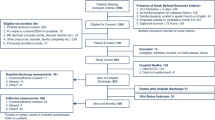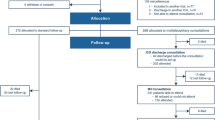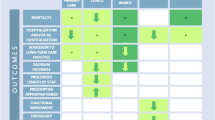Abstract
Background and aims: Debates regarding unnecessary admissions and the benefit of hospitalization of older people for acute care lack data about severity of disease in older compared with younger patients, and comparison of gender. The objective was to assess the severity of illness upon admission in relation to age and gender, in a single-center, prospective observational study. Place was the Emergency room in a general community hospital in Oslo, Norway. Patients were consecutively admitted for acute care from October 1st to December 31st 2006. Methods: The Acute Physiological Score (APS), which is part of the Acute Physiology and Chronic Health Evaluation (APACHE II) upon admission, age and gender, were main outcomes. Results: Of a total 1736 patients admitted, 1565 (90.1%) were included in the study, 918 (58.7%) women and 600 (38.3%) aged 80+ years. Estimate (95% CI) for the age effect on the APS was 0.02 (0.016, 0.024), p<0.0001, which implies that the APS increases by 0.2 for every increase of one year, after adjusting for co-morbidities. The effect of female gender was −0.39 (−0.54, −0.24). Gender difference was highest among patients 80 years and older. Conclusions: Older patients admitted for acute care have a higher severity of disease than younger ones. Males have more severe disease than females, particularly the oldest.
Similar content being viewed by others
References
Ponzetto M, Maero B, Maina P et al. Risk factors for early and late mortality in hospitalized older patients: the continuing importance of functional status. J Gerontol A Biol Sci Med Sci 2003; 58: 1049–54.
Campbell SE, Seymour DG, Primrose WR. A systematic literature review of factors affecting outcome in older medical patients admitted to hospital. Age Ageing 2004; 33: 110–5.
Bo M, Massaia M, Raspo S et al. Predictive factors of in-hospital mortality in older patients admitted to a medical intensive care unit. J Am Geriatr Soc 2003; 51: 529–33.
de Rooij SE, Abu-Hanna A, Levi M, de Jonge E. Factors that predict outcome of intensive care treatment in very elderly patients: a review. Critical Care 2005; 9: R307–14.
Hubbard RE, Lyons RA, Woodshouse KW et al. Absence of ageism in access to critical care: a cross sectional study. Age Ageing 2003; 32: 382–7.
Rozzini R, Sabatini T, Trabucchi M. A silent ageism in access to critical care. Age Ageing 2004; 33: 517.
Oksuzyan A, Juel K, Vaupel JW, Christensen K. Men: Good health and high mortality. Sex differences in health and aging. Aging Clin Exp Res 2008; 20: 91–102.
www.statbank.ssb.no/statistikkbanken. Tabellid=06089. Accessed 12.03.08.
Knaus WA, Draper EA, Wagner DP et al. APACHE II: A severity of disease classification system. Crit Care Med 1985; 13: 818–29.
Inouye SK, Viscoli CM, Horwitz RI, Hurst LD, Tinetti ME. A predictive model for delirium in hospitalized elderly medical patients based on admission characteristics. Ann Intern Med 1993; 119: 474–81.
Daley J, Jencks S, Draper D, Lenhart G, Thomas N, Walker J. Predicting hospital associated mortality for Medicare patients. JAMA 1988; 260: 3617–24.
Knaus WA, Wagner DP, Draper EA. Relationship between acute physiologic derangement and risk of death. J Chronic Dis 1985; 38: 295–300.
Landefeld CS, Palmer RM, Kresevic DM et al. A randomized trial of care in a hospital medical unit especially designed to improve the functional outcomes of acutely ill older patients. N Engl J Med 1995; 332: 1338–44.
Saltvedt I, Mo ES, Fayers P et al. Reduced mortality in treating acutely sick, frail older patients in a geriatric evaluation and management unit: A prospective randomized trial. J Am Geriatr Soc 2002; 50: 792–8.
Ranhoff AH, Rozzini R, Sabatini T et al. Subintensive care unit for the elderly: a new model of care for critically ill frail elderly medical patients. Intern Emerg Med 2006; 1: 197–203.
Hamel MB, Davis RB, Teno JM et al. Older age, aggressiveness of care, and survival for seriously ill, hospitalized adults. SUPPORT Investigators. Study to Understand Prognoses and Preferences for Outcomes and Risks of Treatments. Ann Intern Med 1999; 131: 721–8.
Author information
Authors and Affiliations
Corresponding author
Additional information
The results of this paper were presented as abstracts at the European Union Geriatric Medicine Society (EUGMS) Congress in Copenhagen in September 2008 and the 19th Nordic Congress of Gerontology in Oslo in May 2008.
Rights and permissions
About this article
Cite this article
Rashidi, F., Mowinckel, P. & Ranhoff, A.H. Severity of disease in patients admitted for acute care to a general hospital: age and gender differences. Aging Clin Exp Res 22, 340–344 (2010). https://doi.org/10.1007/BF03337730
Received:
Accepted:
Published:
Issue Date:
DOI: https://doi.org/10.1007/BF03337730




